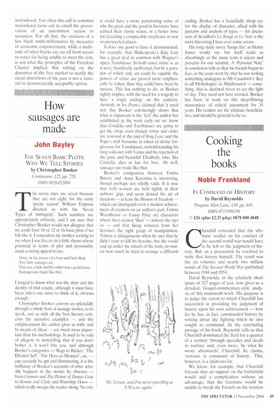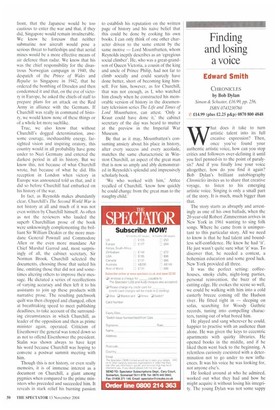Cooking the books
Noble Frankland
IN COMMAND OF HISTORY by David Reynolds Penguin/Allen Lane, 130, pp. 6451. ISBN 0713998199
£26 (plus £2.25 p&p) 0870 800 4848
Churchill conceded that the ultimate verdict on his conduct of the second world war would have to be left to the judgment of history. But, as a precaution he resolved to write that history himself. The result was the six volumes and nearly two million words of The Second World War published between 1948 and 1954.
David Reynolds, in the relatively short space of 527 pages of text, now gives us a detailed. Gospel-commentary-style analysis of this mammoth work. His purpose is to judge the extent to which Churchill has succeeded in providing the judgment of history upon his own achievement — how far he has, in fact, commanded history by writing about the fighting which he also sought to command. In the concluding passage of his book, Reynolds tells us that Churchill dominated the field for a quarter of a century 'through speeches and deeds in warfare and, even more, by what he wrote afterwards'. Churchill, he claims, 'remains in command of history'. This, however, is a claim too far.
We know, for example, that Churchill foresaw that air support on the battlefield would add a complication without an advantage, that the Germans would be unable to break the French on the western
front, that the Japanese would be too cautious to enter the war and that, if they did, Singapore would remain invulnerable. We know he foresaw that neither submarine nor aircraft would pose a serious threat to battleships and that aerial mines would be a more effective means of air defence than radar. We know that his was the chief responsibility for the disastrous Norwegian campaign in 1940, the despatch of the Prince of Wales and Repulse to Singapore in 1942, that he ordered the bombing of Dresden and then condemned it and that, on the eve of victory in Europe, he asked the chiefs of staff to prepare plans for an attack on the Red Army in alliance with the Germans. If Churchill was really in command of history, we would know none of these things or of a whole lot more suchlike.
True, we also know that without Churchill's dogged determination, awesome courage, inexhaustible energy, farsighted vision and inspiring oratory, this country would in all probability have gone under to Nazi Germany and entered the darkest period in all its history. But we know this, not because of what Churchill wrote, but because of what he did. His reception in London when victory in Europe was announced told us that, and it did so before Churchill had embarked on his history of the war.
In fact, as Reynolds makes abundantly clear, Churchill's The Second World War is not history at all and much of it was not even written by Churchill himself. As often as not the reviewers who lauded the superb Churchillian prose of the book were unknowingly complementing the brilliant Sir William Deakin or the more mundane General Pownall and Commodore Allen or the even more mundane Air Chief Marshal Garrod and, most surprisingly of all, the cabinet secretary, Sir Norman Brook. Churchill selected the documents, choosing those that suited his line, omitting those that did not and sometimes altering others to improve their message_ He dictated a series of recollections of varying accuracy and then left it to his assistants to join up these products with narrative prose. The resulting patchwork quilt was then chopped and changed, often at breathtaking speed to meet publishing deadlines, to take account of the surrounding circumstances in which Churchill, as leader of the opposition and then as prime minister again, operated. Criticism of Eisenhower the general was toned down so as not to offend Eisenhower the president. Stalin was shown always to have kept his word because Churchill was hoping to convene a postwar summit meeting with him.
Though this is not history, or even really memoirs, it is of immense interest as a document on Churchill, a giant among pygmies when compared to the prime ministers who preceded and succeeded him. It reveals in stark relief his burning passion to establish his reputation on the written page of history and his naive belief that this could be done by cooking his own books. I can only think of one other character driven to the same extent by the same motive — Lord Mountbatten, whom Reynolds ineptly describes as an 'egregious social climber'. He, who was a great-grandson of Queen Victoria, a cousin of the king and uncle of Prince Philip, had not far to climb socially and could scarcely have done better, short of becoming king himself. For him, however, as for Churchill, that was not enough, as 1, who watched him closely when he constructed his memorable version of history in the documentary television series The Life and Times of Lord Mountbatten, can attest. 'Only a Kraut could have done it,' the cabinet secretary of the day was heard to mutter at the preview in the Imperial War Museum.
Be that as it may, Mountbatten's consuming anxiety about his place in history, after every success and every accolade, matches the same characteristic in Winston Churchill, an aspect of the great man that is now so amply and ably demonstrated in Reynolds's splendid and impressively scholarly book.
'We who worked with him,' Attlee recalled of Churchill, 'know how quickly he could change from the great man to the naughty child.'



























































































 Previous page
Previous page